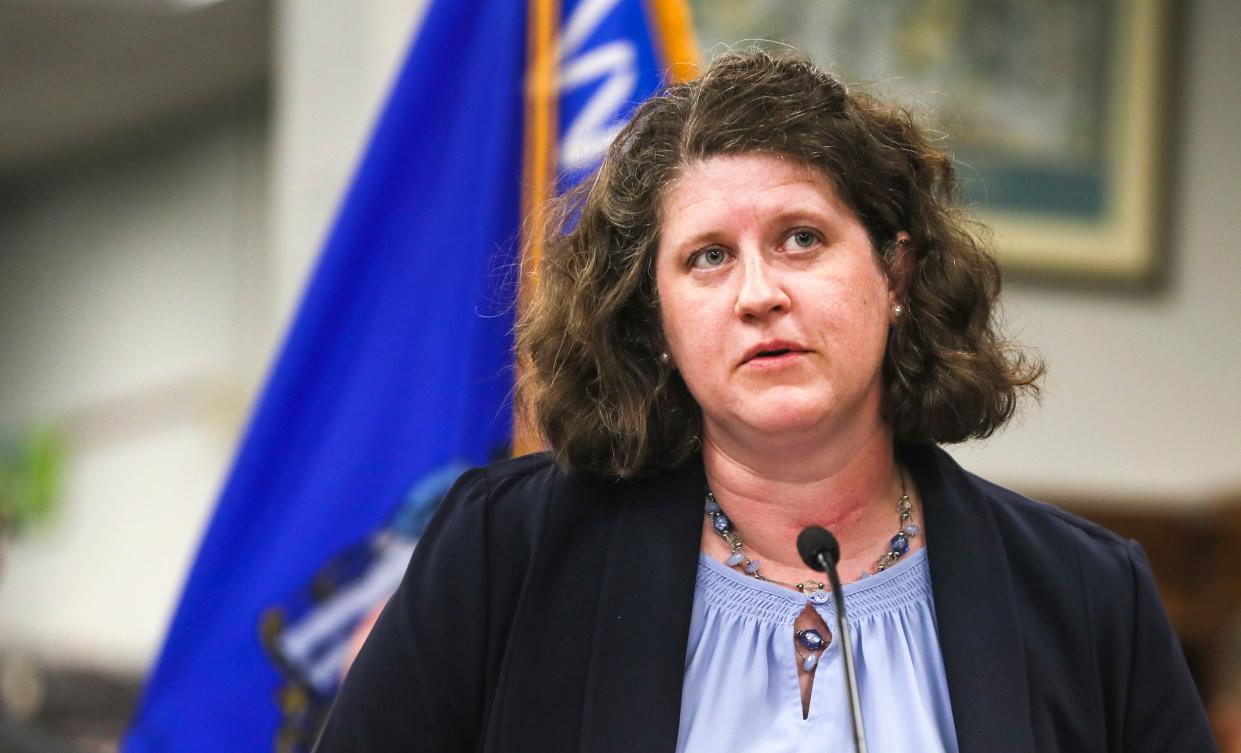In annual address, state superintendent touts new reading law, defends diversity efforts

- Oops!Something went wrong.Please try again later.
As some officials work to undo equity and inclusion efforts in schools, Wisconsin state superintendent Jill Underly on Thursday made diversity the central theme of her annual "State of Education" address, painting a picture of schools "on a precipice."
"We are at a critical moment in history, where we can choose hope and soar, or we can choose destruction," Underly said, calling for leaders to address discrimination, celebrate diverse backgrounds and stop banning books.
Speaking in the Capitol rotunda, Underly also touted one subject where she was able to come to agreement with Republican lawmakers: new legislation that requires phonics-based reading curriculum.
Underly says she's 'proud' of Wisconsin's new reading law with focus on phonics
Underly said her staff at the Department of Public Instruction spent much of this year working with lawmakers on reading legislation that was finalized in July.
The law requires young elementary students to get "science-based" reading curriculum with a focus on phonics, including an understanding of how letters form different sounds together.
The law prohibits what's called "three-cueing," beginning next school year. That's a reading method that asks students to look for clues in context and pictures when they're trying to read a word, in addition to sounding it out. Guidance from DPI explains that teachers can still discuss context clues but should first prompt students to try to sound out words with their phonics skills.
Underly said the legislation was an example of working "together to advance good policy."
"I'm proud of that work and the work that we are now undertaking to get our schools access to important support and quality resources," she said.
This month, DPI is appointing a council that will review curricula and make recommendations for science-based early literacy curriculum that schools can use. DPI is planning to present those recommendations by Jan. 1. As of Thursday, a department spokesperson said he believed the council members who have been selected are being notified.
A previous version of the bill would have required third graders to repeat third-grade reading if they failed to meet certain benchmarks. After objections from DPI and Gov. Tony Evers, lawmakers removed that provision. The law does require personal literacy plans, including summer classes, for students who fail to meet third-grade benchmarks.
Underly emphasizes value of diversity, accuses others of 'homogenizing learning'
Underly's remarks Thursday continually returned to the value of diverse classrooms and the need to support the state's most vulnerable students.
School efforts that specifically support or teach about communities of color or LGBTQ+ students have been attacked by some conservative lawmakers, school board members, political donors and the Wisconsin Institute for Law & Liberty.
Underly said there are "some leaders" who are trying to "homogenize learning in a way that is just not reflective of historical or current reality of a child's lived experience." Asked for examples, a DPI spokesperson said Underly was referring to "attempts to reduce cultural diversity in schools."
Underly said those efforts, along with a focus on test scores, go against what she has heard from students around the state about what they want from their schools.
"They want their schools to be places where they can study complicated histories, have meaningful discussion and learn how to be involved citizens in a world that grows more diverse by the day," Underly said. "Our children want safety, they want to see leaders address discrimination, and they really want adults to stop banning books."
Underly also emphasized safety for LGBTQ+ students.
Several school districts have passed policies that prohibit staff from referring to students by their preferred name and/or pronouns without a legal guardian's permission, which goes against recommendations from the DPI, which emphasize respecting names and pronouns that students feel most comfortable with.
"Creating safety for LGBTQ plus kids is not controversial," Underly said. "It's the bare minimum."
Underly honored five Wisconsin Teachers of the Year
Underly also honored five Teachers of the Year at the Capitol on Thursday:
Saghar Homayounpour, computer science teacher at New Berlin West High School in the New Berlin School District
Claudia Heller de Messer, an English as a Second Language teacher at Milwaukee Parkside School for the Arts in Milwaukee Public Schools
Rachel Kumferman, school social worker at McKinley Elementary School in the Wauwatosa School District
Katelyn Winkel-Simmerman, mathematics teacher at Cedar Grove-Belgium Middle School in the Cedar Grove-Belgium School District
Brian Collins, biology teacher at Unity High School in the Unity School District
Contact Rory Linnane at rory.linnane@jrn.com. Follow her on Twitter at @RoryLinnane.
This article originally appeared on Milwaukee Journal Sentinel: Wisconsin Superintendent Underly touts reading law, diversity efforts

